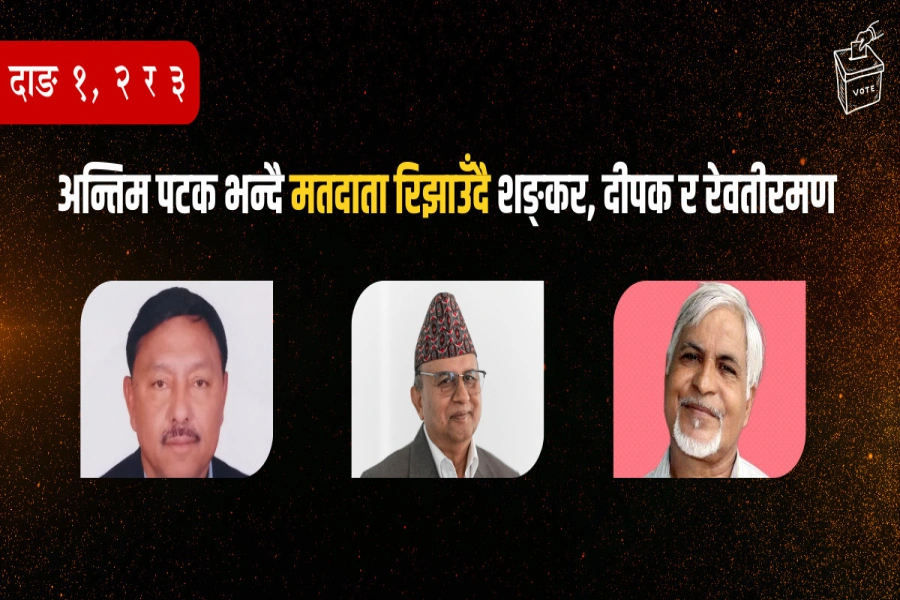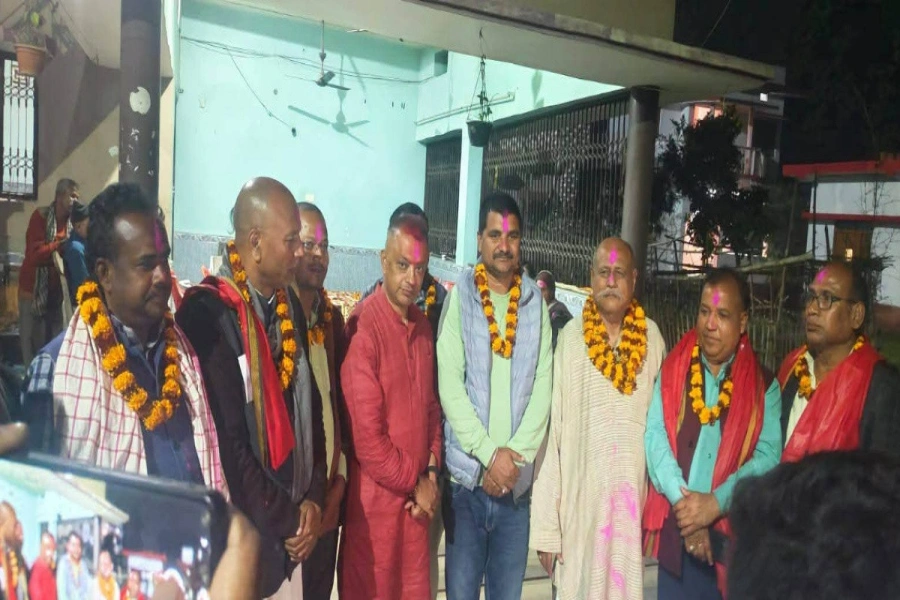Nepal has failed to take comparative advantage by forging economic alliances and business cooperation with economic giants even though we are already dependent on them
Political economy and interdependence refer to bonding relationships where parties mutually rely on each other, adapting to better management of harmony, togetherness and autonomy. This requires letting go co-dependence, ego and extreme independence. However, socio-cultural environmental norms teach us to be strong, never to be weak or reveal weaknesses to others or depend on others. Growing up in such a socio-cultural setting might keep us disconnected from developments and trends occurring elsewhere.
Interdependency simply refers to economic interdependence of two or more nations as we have witnessed during the past decades of globalization, expansion of market, trade, investment, innovation and technology surge beyond the borders of industrialized economies of the West. Political economy thus concerns a mixture of politics, economics, sociology, philosophy and history bringing together how humans interact with each other to live within societies and how nations interact in their relationships with one another.
Modern day political economy is also about production, investment, technology, innovation, foreign trade, poverty, social care and basic ingredients of development and their relations with law, custom, government and distribution of national income. This involves governance, structure, institutions and societies and relationship with distribution of national income and wealth. State must examine relationships between ethnic diversity and economic development, and the ways in which social harmony and development influence each other.
Economic development, on the other hand, is about allocation of scarce resources within multitudes of “wants” and “needs”. Politics is used to allocate the resources within a state to provide for the people and in nation building. With this premise, political economy in a country establishes relationships between individuals and society, and crucially, the relationships between citizens and states.
Exploring model
Political economy for development measures the empirical reality, theory, and governance problems of development, poverty and inequality. The way scarce resources are distributed within an economy determines the type of economic system. Three types of political economies—market economy (or capitalism), command economy (or communism) and mixed economy (or socialism)—are found in economic development history. Each economic model comes with its own strengths and weaknesses. The challenges, however, are how the government manages it. Economic development lays importance on development processes, structures and institutions which shape economic environment and deliver economic outcomes. Irrespective of the model, the fundamental problems of an economy arise from the central problem of scarcity of resources that we need to address from the start: What to produce? How to produce? For whom to produce and distribute?
Nepal's informal economy is 41 percent of GDP

History of economic development of the past century suggests that higher rates of economic growth are possible in societies which have high levels of economic and political freedom and good governance. However, experiments of the past decade on global market liberalization witnessed diminished trade barriers and surge in technology while innovations spurred spectacular global growth. Yet, there is no single empirical model of economic development that could be replicated across all societies for there appeared aberrations in distribution of wealth for want of robust social compact. This is the new challenges of the next decade.
Nepal in global context
Sustaining economic progress is proving to be a bigger challenge for Nepal as state institutions fail to demonstrate good governance and efficiency. Projected GDP growth, largely based on mercurial seasonal agriculture and unstable service sectors, is unsustainable. These sectors are defenseless to external forces—depletion of natural resources, climate change, sluggish world economic environment and market reorientation.
Last March, Government of Nepal organized International Summit on Foreign Investment in Kathmandu and sought foreign investments of about US$ 36 billion. It fell short of expectations and did not produce the high political optimism and enthusiasm among private foreign investors. This warrants revisit of investment strategies and the ways of doing things, more realistically and pragmatically.
Nepal continues to rank one of the lowest in the global index of doing business environment. The laws associated with foreign direct investments and technology transfer for industrial and manufacturing are restrictive compared with other nations, including ASEAN. Small and Medium scale Enterprises (SMEs)), which form a sound economic foundation, are restrictive and narrow due to undesired level of protectionism.
Low investment in agriculture has contributed to “food insecurity”. Nepal is disproportionately dependent on basic food imports from India. This has created trade imbalance and unfavorable balance of payments with loss of foreign exchange. Threat to nation’s food security puts Nepal on the edge of economic disintegration because of undependable relations with economic powers because policies are not based on pragmatic economic interests of the times. This makes Nepali economy vulnerable.
Nepal is economically interdependent with several countries. For example, bulk of food and petroleum products comes from India. Other household goods are imported from China. National foreign currency reserve is largely built by overseas remittances. Nepali rupee is pegged with Indian rupee that provides protection from external currency fluctuations and inflationary pressures. In policy terms, Nepal has failed to take comparative advantage of economies of scale by forging economic alliances and business cooperation with economic giants even though we are already economically dependent on them. More importantly, geographic proximity dictates pragmatism.
Way forward
Given our geographical reality forging partnerships with friendly countries like China, India, Bangladesh, Myanmar, Thailand, Cambodia and Vietnam makes business-sense. We also need to benefit from the Generalized System of Preferences (GST) in trade under the WTO (World Trade Organization) rules. This will, however, require positive revisions to investment related laws in banking, finance, tax, arbitration and immigration, consolidation of laws into one simple, single and handy document and allowing private foreign direct investments without restrictions in all economic sectors, including in SMEs, industries in leisure, eco-tourism, lifestyle and Supply Value Chain.
Foreign direct investment threshold should be abolished and policies should be reoriented at expanding domestic job market. Policy strategy on “building” infrastructure and connectivity aiming at lowering production costs, easing cross-border transportation and access to larger markets should be on top of planning priority. “Production” of goods and services and enhancing institutional “monitoring” and “managing” capabilities for efficiency and global competitiveness should prevail over the next development plan.
A cursory observation of political economy of development scenario of Nepal projects a misplaced and misguided economy because successive government plans, promises and programs have failed to deliver desired outputs. Lackluster approach to marshaling mitigating measures for managing environment, agriculture, land use, water resources, mass transit, infrastructure, poverty, utility services, disaster management and foreign investment leaves a lot to be desired. This warrants structural reforms.
Media reports indicate some 35,000 persons die annually due to air pollution in Kathmandu Valley while almost one million people suffer from upper respiratory tract complications. Degrading quality of life and living standards seems to suggest economic strategies and governance have faltered to address development priorities and welfare of the people.
Education system also needs reforms aligned with the development aspirations with emphasis on science and technology, and tertiary vocational skills for qualitative improvement of market forces. Policy statements of leaderships are not aligned with economic imperatives of the times, and justice system appears vacillating with faltering implementation of rule of law. In addition, there are emerging signs of tapering confidence in state institutions due to corruption and lack of accountability. Although the constitution in principle aspires to follow socialism, economy in practice appears like a swinging pendulum of a wall clock for lack of marshal plan for speedy development.
There are around one million Nepali diaspora spread around the world. They are keen to relate back home and participate in the government-led development process. Diaspora has a large reservoir of thousands of scholars and scientists. This human capital can be accessed through the Brain Gain Centre, a repository of knowledge and expertise available at the Ministry of Foreign Affairs, and policy think-tank like Nepal Policy Institute (NPI). Government of Nepal can tap into these reservoirs through a mechanism of transfer of knowledge through expatriate nationals in nation building. Countries like India and China have successfully capitalized on similar human capital. Nepal can, and should be able to, do the same.
The author, a retired UNHCR international staff, is President of We for Nepal
Neupanek1950@gmail.com





































